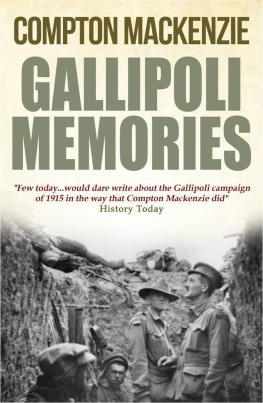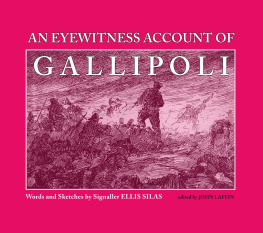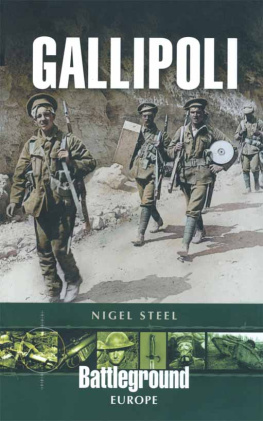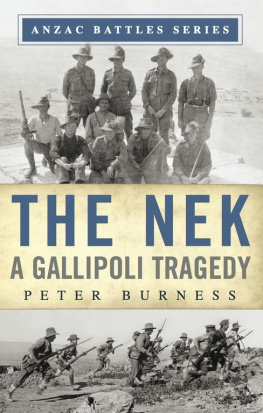GALLIPOLI MEMORIES
COMPTON MACKENZIE
Compton Mackenzie 1929
Compton Mackenzie has asserted his rights under the Copyright, Design and Patents Act, 1988, to be identified as the author of this work.
First published 1929 by Cassell and Company Ltd.
This edition published by Endeavour Press Ltd in 2014.
Table of Contents
TO ORLO WILLIAMS WHO IN MARCH, 1915, BEGAN THIS BOOK
PREFACE
The title of this book strictly expresses what it is . I kept no journal , and the few letters I wrote while I was at Gallipoli , though useful for fixing dates , were too much taken up with the domestic problems at home of money , clothes , books , gardens and domicile , together with requests for what were called comforts for the troops to spend much time over life on the Peninsula . On the whole I do not regret my failure to keep a journal , for by not doing so I have been compelled to retain impressions , conversations , voyages , and actions in my head , which means that they are as fresh now as fourteen years ago . Moreover , continuous pondering over them during that period has enabled me , I hope , to achieve a measure of selection . At the same time , this is so entirely a personal record that it inevitably possesses many of the faults of a diary , and I fear that nowhere does my narrative succeed in transcending the particular or escaping from egoism . It remains a peculiar , not a general experience , and as such I beg that it may be read .
This first volume adds nothing of the least historical value to the literature of the war , though in succeeding volumes I hope to shed some light on the situation in Greece during 1916 and 1917 , which , obscure enough in any case , has been still further obscured by a mass of partisan writing on both sides .
I should have liked to squeeze my memories of Athens into one volume , but I fear that will be impossible if I preserve , as I am anxious to preserve , the human aspect of an extraordinary state of politics . So Gallipoli Memories will be followed by Earlier Athenian Memories, covering the period from the end of August , 1915 , to the resignation of the Skouloudis Cabinet at the end of June , 1916 . The third volume , Later Athenian Memories, will close with the tragic farce of December , 1916 . The final volume , gean Memories, will be chiefly concerned with life and adventure in the Greek Islands during 1917, but it will also include a certain amount of political history .
Ever since the war I have been meditating over a war novel . Indeed I have long had an immense affair in seven volumes mapped out ; but I have finally come to the conclusion that my experiences in Athens and the Cyclades will make a better novel if related as fact . I cannot invent a better story than what actually happened . I cannot imagine more richly tragical , comical , and farcical characters than I actually met . Even the time I spent at Gallipoli seems to compose itself into a tale . The conversations I record may not achieve the accuracy of the dictaphone; but that is only because I have selected what was necessary to convey the spirit of them . Were I to have printed in italics the actual words used , most of them would have appeared in that type . Here and there I have used invented names instead of real ones , for reasons which will be obvious ; but such discretion is rare . I may add that I have resisted the temptation to refresh my own memory by drawing upon that of others . For any minor inaccuracies which might have been avoided by less independence , I apologize; but personal responsibility was essential to the form of narrative I have chosen , and I wish to make it clear that I fully accept that responsibility .
My object has been to recapture the spirit in which I passed through a memorable experience . This must be my excuse for not displaying as much moral indignation as the mood of the moment expects from a writer about the War .
Isle of Jethou ,
August 31st, 1929.
CHAPTER I - THE BEGINNING OF THE WAR
Toward the end of July, 1914 my wife and I were hurrying back from Capri, partly because the European situation looked unpropitious for the task of finishing the second part of Sinister Street , which Martin Secker wanted to bring out in the Autumn, but chiefly because I hoped that the Serbian crisis would be solved and that as soon as my book was written I should be able to volunteer for service against Ulster.
Secker had asked us to stay with him at Iver, and we were there when the midnight ultimatum expired amid the silence of that August countryside through which the dusty road wound glimmering. Seckers sedate house built in the reign of Queen Anne wore an air of having lived through too many famous events to be any longer capable of responding to the excitement of its inmates. I leaned out of a bedroom window, my thoughts losing themselves like moths in the darkness when I tried to catch them and pin them down to the problem of the part I should play in this convulsion. And then abruptly the hush of that warm leafy night was disturbed by the remote rumbling of trains, one after another of them rolling and rumbling southward; guns themselves would not have muttered a heavier menace of change. I fell asleep to that endless sound of trains, and in the morning I went up to London to see what could be done about getting myself into the thick of events. I interviewed a soldier friend at the War Office who was frankly contemptuous of my plan to join a territorial battalion of the Seaforth Highlanders.
Youd be no earthly good to us, he assured me.
I was an officer in the First Hertfords when I was seventeen. Its not as if I had never had any military experience.
Go back to your work. Youll be doing more good by keeping us cheerful with your novels. We really do not want married subalterns of thirty-one.
So back I went to Iver, crestfallen; and there I sat up all night and every night for two months, writing the last three hundred pages of Sinister Street . I used to have my breakfast when the rest of the household was having tea, and about six oclock Secker used to get home from John Street with the evening papers and all the garnered rumours of the day. No wonder the left-hand pages of the manuscript are scrabbled over with names like Louvain and Ypres and Valenciennes. They must have been written down almost automatically while my conscious mind on the right-hand page struggled with those reputedly mellifluous sentences, which were at any rate as sticky as honey to clarify. The book was being printed as I wrote it, so that it might be ready for publication within a month of penning the last word.
In October I decided to try again for a commission; but this time doctors were the discouragement. I should never pass a medical examination I was assured, and the only climate where I was likely to be of any use would be somewhere like Egypt. An admiring and hopeful friend told me that Sir John Maxwell would welcome my services on his Staff, and one afternoon at the Savile another friend offered to introduce me to Mr. H. J. Tennant, who was having tea in the club. A personal interview with the Under-Secretary of State for War seemed in my mood at this date the kind of magical good fortune that happened to poor fishermen in The Arabian Nights . Alas, the Under-Secretary was not so powerful as I had supposed he must be. All he could do for me was to tell me that the 42nd Division consisting of Lancashire Territorial battalions was in Egypt, and that if I wanted to reach Egypt the only way it could be managed was by applying for a commission in one of those battalions through the Lord Lieutenant or some such Lancastrian dignitary. As a child I had supported the Red Rose against the White; but my personal interest in Lancashire did not extend beyond that. Besides, what doctor in England was going to pass me fit for general service abroad? The interview with the Under-Secretary of State for War came to an end. I see him now in our faded old smoking-room at 107 Piccadilly. We were not as a club famous for dandyism, and whether it was the comfortable shabbiness of the room or the equally comfortable bagginess of the members trousers I do not know, but certainly as I try to recapture the details of that interview I seem to fancy the impression of a slightly excessive elegance in Mr. H. J. Tennant, a certain statesmanlike unreality about his high glossy collar. Perhaps I thought that an Under-Secretary of State for War had no business to resemble so closely a Vanity Fair cartoon of the nineties unless he could do something more useful and affair than tell me what I knew already, unless he could in fact obtain for me a job on the Staff of Sir John Maxwell. We were most of us in a condition of elated credulity at that early stage of the war, and this was my first disillusionment. When I was a small boy I was once bidden to observe the Empress of Austria walking up from the beach at Cromer. The usual exhortation of my nurse was not to stare at people, so I naturally expected a vision of the utmost magnificence. I saw instead a woman in a grey alpaca dust-cloak who was carrying a straw-coloured parasol to shield herself from curious eyes. The Empress of Austria! In that wan withering moment empresses whether of Austria or Byzantium or Rome went the way of fauns and fairies. Now twenty-five years later an Under-Secretary of State for War took the same prosaic road.











